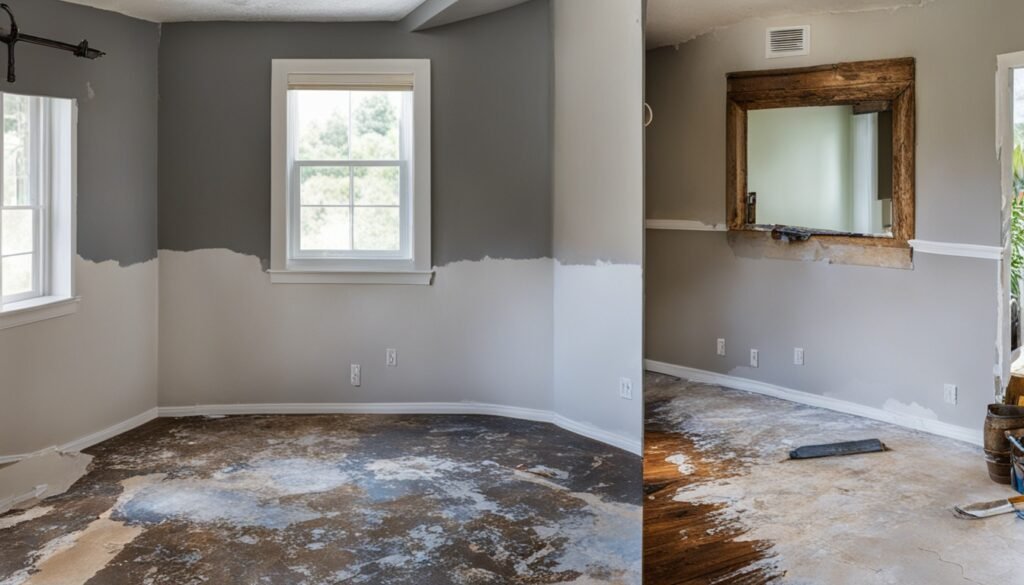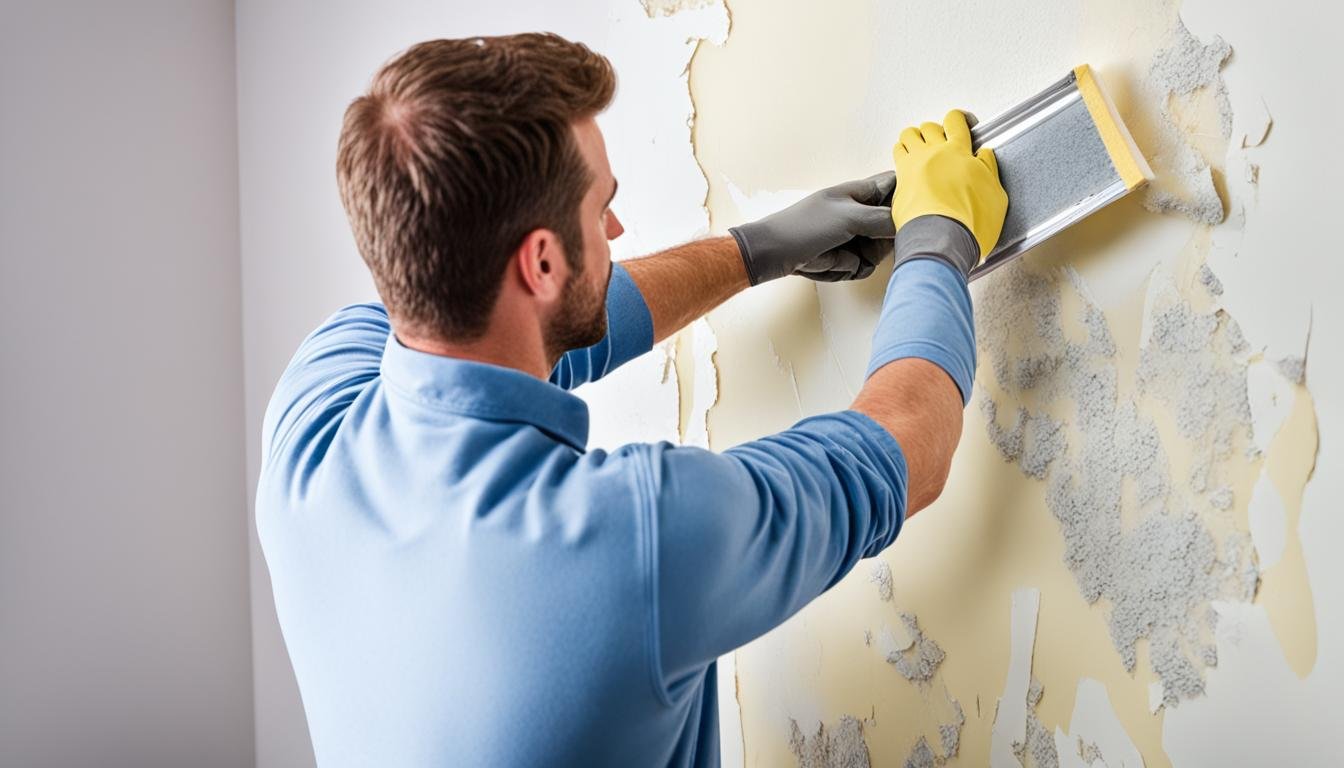Water damage is a big problem for many homeowners. Each day, around 14,000 people in the U.S. face water-damage emergencies in their homes. It’s vital to fix moisture problems in your walls early.
Leaving water damage unattended can cause bigger issues later. For example, it can lead to cracks, paint that peels off, and mold. These problems are not only expensive to fix but can also harm your health.
Key Takeaways
- Prompt attention to water damage is essential to prevent further deterioration and potential health hazards.
- Identifying the source of moisture and addressing it is the first step in the repair process.
- Removal of damaged drywall and proper drying of the affected area are crucial before proceeding with repairs.
- Selecting the right materials, such as water-based sealers and paints, is important for long-lasting results.
- Following manufacturer-recommended drying times is key to ensuring a successful wall restoration project.
Identifying and Preparing for Wall Repair
To begin fixing water-damaged walls, we need to spot the signs first. Look for cracked paint, bubbling wallpaper, and soft drywall. You might also notice musty smells and water stains. These issues usually pop up because of slow leaks, bad seals, or clogged gutters.
It’s vital to check the damage areas closely. This helps figure out how bad it is and what to do next.
Signs of Water Damage on Walls
One sign of water damaged walls is if the paint is cracked. This can mean there’s water underneath, from leaky pipes or not enough airflow. Mold remediation might be needed if it’s been wet for a while.
Also, keep an eye out for bubbling wallpaper or warping drywall. It shows the wall soaked up water, making it soft or spongy. This means it needs attention.
Don’t ignore musty smells or water rings on walls. They quietly warn of problems like leaks or too much moisture. These can badly damage walls over time.
Locating and Addressing the Source
Before fixing the walls, find and fix the leak source first. It could be a leaking roof or broken pipe. Solving this stops the issue from happening again. Without fixing this, wall repairs are just temporary.
Getting the area completely dry is crucial before you start fixing the wall. This step helps make repairs last longer. Visit sanbernardinowaterdamagerestoration.com or contact the Water Damage Pros for help with finding leaks and waterproofing.
Repairing Moisture-Damaged Walls
The first step is finding and fixing the moisture damage source. Next, cut out the damaged drywall using a keyhole saw. You can remove it by hand or with a hammer. Try to keep the removed drywall to use as a guide for the new piece.
Cutting and Removing Damaged Drywall
To handle drywall moisture damage, being careful is key. Use a keyhole saw to create a neat cut around the damage. Then, take out the damaged drywall. It’s best if you can use it as a pattern for the new drywall.
Installing Drywall Patches or Panels
If the wall restoration is small, you might only need a drywall patch. Cut it to fit, then fasten it with screws and cover the seams with compound. For bigger fixes, you might need to put in a full drywall panel, attached to the studs or joists. Make sure to install it well to keep your wall smooth and strong.
Fixing water-damaged walls can seem tough, but the team at San Bernardino Water Damage Restoration is here to help. Their skilled Water Damage Pros are ready to work 24/7. They’ll get your moisture damage repair done right.

Conclusion
Fixing walls with moisture damage is a step-by-step process. It needs finding the cause of the problem, ripping out damaged drywall, and sealing the new wall properly. With this guide, people in Pembroke Pines can fix their walls and stop more problems.
If the damage is big or has mold, it’s best to call experts. Companies like Water Damage Pros in San Bernardino know how to check everything and do safe mold removal. Homeowners who use the right methods can make their walls like new and keep their house strong and pretty.
Finding leaks early and fixing them, plus controlling indoor humidity, is key to keep walls safe. Tackling water damage fast and well protects your home and keeps it cozy and dry.
FAQ
What are the signs of water damage on walls?
How can I locate and address the source of water damage?
How do I remove and replace damaged drywall?
When should I consider hiring a professional water damage restoration company?
Source Links
- https://www.inspirationspaint.com.au/articleview/242/how-to-repair-water-damage-in-your-living-room
- https://www.truevalue.com/diy-projects/maintenance-and-repair/water-damage-restoration-for-walls-and-ceilings/
- https://www.1800waterdamage.com/wall-water-damage/
- https://www.forbes.com/home-improvement/interior/how-to-repair-water-damaged-wall/
- https://elitepropainting.com/how-to-repair-water-damaged-drywall-a-step-by-step-guide/
- https://www.linkedin.com/pulse/water-damage-drywall-repair-comprehensive-guide-ron-hogan-dmhnc
- https://www.familyhandyman.com/list/12-tips-for-water-damage-repair/
- https://www.puroclean.com/blog/help-my-walls-and-ceilings-have-water-damage-what-do-i-do/
- https://dryforcecorp.com/how-to-repair-water-damage-on-plaster-walls/
- https://www.puroclean.com/pembroke-pines-fl-puroclean-pembroke-pines/blog/how-to-repair-water-damaged-drywall-in-pembroke-pines/
- https://paintwithapex.com/6-steps-to-fix-water-damaged-wall-paint/
- https://codamagerestoration.com/how-to-repair-water-damaged-walls/


